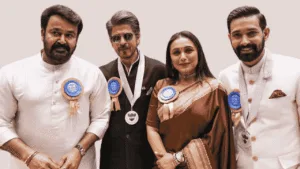President Murmu Gives Dadasaheb Phalke Award To Mohanlal
Newz Daddy Entertainment Updates
The President of India, Smt Droupadi Murmu, presented the 71st National Film Awards in various categories in New Delhi today (September 23, 2025). She also conferred the Dadasaheb Phalke Award for the year 2023 on Shri Mohanlal.
The Dadasaheb Phalke Award is India’s highest honour in cinema, instituted in 1969 in memory of Dhundiraj Govind Phalke, the father of Indian cinema. It is given for outstanding contribution to Indian films, and past recipients include legends like Raj Kapoor, Lata Mangeshkar, Amitabh Bachchan, and Rajinikanth. Mohanlal, one of the most acclaimed actors in Indian cinema, joins this elite list.
Speaking on the occasion, the President congratulated all the award winners, as well as Shri Mohanlal, who received the Dadasaheb Phalke Award. She said that Mohanlal Ji has effortlessly portrayed the softest of the soft and the harshest of the harsh emotions, creating an image of the Complete Actor.
Mohanlal, often referred to as “Lalettan” by his fans, has acted in over 350 films across Malayalam, Hindi, Tamil, Telugu, and Kannada. He has previously received five National Film Awards and multiple Kerala State Awards. His versatility ranges from family dramas to action thrillers, making him a household name across India and among the Indian diaspora.
The President was happy to note that women-centric good films are being made and getting awards, too. She said that we all see that women struggle to some extent with poverty, patriarchy, or prejudice. She noted that the films awarded today include stories of mothers shaping the morals of their children, women uniting to confront social stereotypes, the plight of women amidst the complexities of home, family, and social order, and stories of courageous women who raise their voices against the inequalities of patriarchy. She appreciated such sensitive filmmakers.
In recent years, films like Thappad, Gangubai Kathiawadi, and The Great Indian Kitchen have highlighted women’s voices and challenged stereotypes. The National Film Awards, too, have recognised such works, showing the growing importance of socially relevant storytelling in Indian cinema.
The President said that the world’s largest film industry represents the world’s largest democracy and most diverse society through its most influential and popular art form. She was happy to note that everyone associated with cinema has an Indian consciousness, an Indian sensibility that connects all local contexts. Just as Indian literature is created in many languages, Indian cinema is developing in many languages, dialects, regions, and local environments. She said that our films are both local and national.
India produces the highest number of films annually in the world, with works made in more than 20 languages. Regional cinemas like Malayalam, Tamil, Telugu, Bengali, and Marathi have achieved both national and global acclaim. This linguistic diversity mirrors India’s multicultural ethos.
The President emphasised that cinema is not just an industry; it is also a powerful medium for raising awareness in society and the nation and making citizens more sensitive. She said that popularity may be a good thing for a film, but being in the public interest, especially for the younger generation, is even better. She urged all those associated with the film industry to make efforts to ensure that Indian films get greater acceptance, their popularity increases, and they get recognition at the global level.
Indian films are increasingly reaching global platforms, with entries at Cannes, Venice, and Oscars. The success of films like RRR and The Elephant Whisperers at the Academy Awards shows that Indian cinema is gaining strong international recognition. Leaders like the President encouraging public interest films sends a message for filmmakers to balance entertainment with social impact.
Must Read:
The Sabarmati Report is an Ambitious But Flawed Attempt To Explore a Tragic Historical Event.
